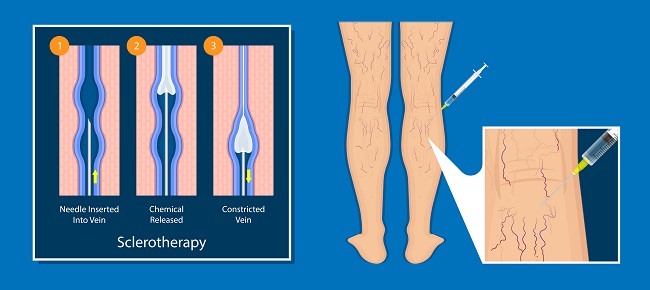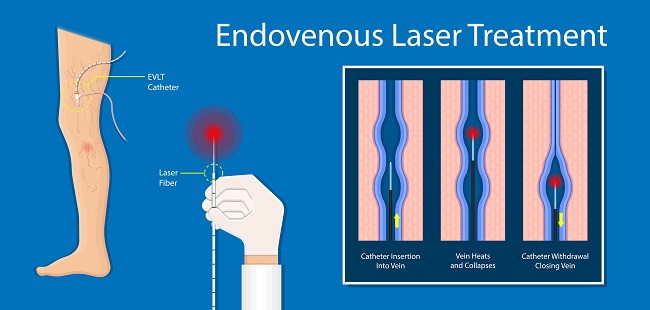When varicose veins cause aches, itchiness and unpleasant swollen bulges, it’s good to find ways to manage and treat the condition. And where before in-hospital vein stripping was the only solution, modern technology is much more advanced and lets us offer several non-surgical treatments for varicose veins.
What are the non-surgical treatments for varicose veins?
Let’s start with some of the common and effective medical treatment options.
Sclerotherapy

Infographic of the sclerotherapy treatment process for varicose veins
Sclerotherapy is a treatment we use for small, uncomplicated varicose veins. It involves injecting a sclerosant into the problem vein through a needle. The sclerosant seals off the varicose vein by agitating the vein walls, causing your body to reroute your blood flow through healthy veins. The sealed vein hardens, and your body will reabsorb it within a couple of weeks. We’ll typically combine sclerotherapy with Endovenous Laser Ablation to ensure the best results.
Temporary side effects include mild itching or swelling. Some patients may also experience blood vessels forming in the treated area (revascularisation), a temporary condition that can last for a few months.
Endovenous Laser Ablation

Infographic of the EVLA varicose vein treatment process
Endovenous Laser Ablation (EVLA) is pretty much what it says on the tin. For EVLA, we use a special laser to heat and clot the problem vein, stopping blood from flowing through it. Unlike sclerotherapy alone, we can use ELA on larger, more complex varicose veins.
You may experience some discomfort like mild soreness and bruising in the treated area after your treatment. You might also experience some side effects like deep vein thrombosis, nerve injury, and skin burns. But, EVLA technology is extremely safe. Complications like these are extremely rare, with only a 1% chance of issues such as DVT occurring.
ClariVein
Like sclerotherapy, ClariVein is a non-thermal, non-surgical varicose vein treatment in which we inject a sclerosant. ClariVein is a special infusion catheter with a needle-fine tip that can rotate 360 degrees. The catheter’s flexibility and ability to penetrate vein walls lets the sclerosant travel deeper into the vein, resulting in more effective treatment for larger varicose veins.
As with sclerotherapy, there’s a slight risk of an allergic reaction, though this is minimal as we conduct an allergen test beforehand.
Radiofrequency Ablation
Similarly to EVLA, Radiofrequency Ablation (RFA) involves a catheter and a heat source. But unlike EVLA, this procedure doesn’t clot the blood. Instead, we target the collagen in the vein wall, causing it to shrink. And as a result, blood flow through that varicose vein stops.
You may experience some bruising and discomfort after the procedure, though you can manage it quite easily with compression stockings and over-the-counter pain relief.
Medical Superglue
Along with clotting, agitating, and shrinking, we can also ‘glue’ the varicose vein shut. We’ll inject a tiny bit of VenaBlock, VenaSeal, or VeinOFF directly into the point where the varicose vein meets the healthy vein. A small bandage will be placed over the incision site. You may also experience a bit of soreness and bruising in the days after your procedure.
All these treatment options are minimally invasive and performed under local anaesthetic.
How do I know which varicose vein treatment is right for me?
We’ll start you off with a consultation with one of our specialists. During the consultation, we’ll review your medical history and perform a physical exam to diagnose your condition.
Next, we do a venous ultrasound to assess your veins. This procedure is crucial because it tells us if the veins are functioning normally or if the blood is flowing in the wrong direction or pooling – a condition known as reflux. The scan can also reveal hidden varicose veins and detect the formation of new blood clots (deep vein thrombosis) or damage from untreated blood clots.
Based on this information, we then create a custom treatment plan best suited to the needs of your veins.
Are there any non-medical treatment options?
Unfortunately, there aren’t any non-medical varicose vein ‘treatments.’ But there are ways you can minimise symptoms (and lower your chances of getting them to begin with!)
Similarly to varicose vein treatment post-op steps, these include:
- Wearing compression stockings (though not constantly. You should mainly wear them on long-haul flights and during strenuous exercise like jogging or weightlifting).
- Changing your diet
- Not sitting or standing for long periods
- Keeping active
Seek specialist advice
Our goal is always to keep you well informed and determine the best solution for you.
So if you have any more questions on non-surgical treatment options or non-medical symptom management, don’t hesitate to contact us on 0420 102 637 or request an appointment online.

